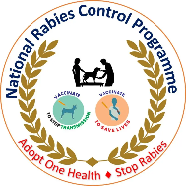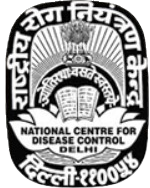About NAPRE
National Action Plan for Dog Mediated Rabies Elimination from India by 2030 (NAPRE)
Rabies is one of the most fatal zoonotic diseases which has tormented humans since antiquity. It is transmitted after the bite of a rabid animal and is 100 % fatal if the timely intervention in terms of appropriate management of wound and Rabies post exposure is not given to the animal bite victims. About 96% of the mortality due to Rabies is associated with dog bites. Effective prevention and control of Rabies could be achieved by concerted efforts by all stakeholders by adopting “One Health Approach”.
In 2015, the world called for action by setting a goal of “Zero human deaths due to dog-mediated rabies by 2030”, worldwide. Subsequently, four organizations – the World Health Organization (WHO), the World Organization for Animal Health (OIE), the Food and Agriculture Organization of the United Nations (FAO), and the Global Alliance for Rabies Control (GARC) – have joined forces, as the United Against Rabies collaboration, and determined to reach the global target of “Zero human deaths due to dog-mediated Rabies by 2030”. Countries like Western Europe, Canada, the US, Mexico, Japan & Latin America have already eliminated dog-mediated Rabies through successful canine rabies vaccination and One health approach.
NCDC in collaboration with the Ministry of Animal Husbandry organized a workshop on “Stepwise Approach for Rabies Elimination” with technical support from GARC (Global Alliance for Rabies Control). Gaps were identified in the ongoing National Rabies Control Program as well as activities undertaken by veterinary sectors and other stakeholders. Combined with the lessons edlearned from SARE workshop, international consultations on rabies, NRCP review meetings, discussions held during the National technical advisory group on Rabies, Standing Committee on Zoonoses, and external evaluation of the programme, it was felt, that to address the Rabies in the country, One Health Approach is required through concerted and coordinated efforts by all stakeholders. Accordingly, the “National Action Plan for dog mediated Rabies Elimination from India by 2030” (NAPRE) was conceptualized in the year 2018 by the Division of Zoonotic Disease Programme at NCDC and submitted to Ministry. Accordingly, a core committee was constituted under the chairmanship of DGHS and Commissioners animal husbandry. The core committee was having the representation of all key technical experts. Subsequently, the draft was circulated and comments were obtained from the stakeholders namely MoFAHD, MoEF&CC, MoAFW, MoPRI, and MoHUA, and other stakeholders such as NITI Aayog, MoST, NHRC, professional bodies, eminent veterinarian, medical and wildlife experts. A total of 30 key representative stakeholders provided their inputs including hon’ble members of parliament.
On the occasion of World Rabies Day i.e. 28th September 2023 , Union Minister for Health and Family Welfare Shri Mansukh Mandaviya and Union Minister of Fisheries, Animal Husbandry and DairyingShri Parshottam Rupala unveiled the National Action Plan for dog Mediated Rabies Elimination by 2030 (NAPRE) in the presence of Dr. Bharati Pravin Pawar, Minister of State for Health and Family Welfare and Shri Sanjeev Kumar Balyan, Minister of State of Fisheries, Animal Husbandry and Dairying.
This “National Action Plan” for Rabies Elimination in India has been developed with inputs by experts nominated by the different stakeholders. The National Action Plan for the Elimination of dog-mediated Rabies (NAPRE) in India provides a broad framework for combating Rabies. The NAPRE is a guidance document for the states / stakeholders to develop their own action plan, specific to their needs and aims at systematic reduction of Rabies risk through sustained mass dog vaccinations, pre and post exposure prophylaxis and public education until the country is completely free of dog-mediated Rabies. This document will help in the following: -
- To prepare an action plan that canters on the elimination of human Rabies transmitted by dogs.
- To strengthen the States to the commitment on implementation of NAPRE.
- To ensure, for as long as possible, continuity of prevention of human Rabies with effective, quality assured and accessible vaccinations for all who need them.
- To strengthen capacities of the Public Health Services, Veterinary Services and the local governing bodies.
- To identify and support activities that when strategically used would eliminate dog mediated Rabies.
- To strengthen the coordination and support mechanisms among all stakeholders.
- To obtain and sustain high-level political commitment at the central and state level.
- To encourage community participation in urban and rural areas





Objectives:
The helpline will consist of a team of well-trained agents (Graduate and above) working on inbound and outbound processes, supervised by a Team lead. These agents will be continuously updated with crucial information required to full fill objectives of helpline.
Helpline provides a cloud-based Ticketing system with the features like- generate and resolve tickets, track complete life cycle of the ticket, Real time monitoring & tracking of the ticket, SMS notification to Caller on the ticket status, sharing of Geo location of the vaccination centers. It will also have customized reports with the real time dashboard and Data analytics to understand the pattern. An advanced auto dialer system will be implemented to auto-assign incoming calls to available agents. Helpline also has Quality control mechanism to ensure call quality and appropriate information sharing.
All queries on Rabies prevention and control will be handled by a 16*7 dedicated Rabies helpline, with a dedicated number (15400).
Same helpline also handles queries on snakebite.
Presently this helpline will serve five states: Andhra Pradesh, Madhya Pradesh, Assam, Puducherry, and Delhi.